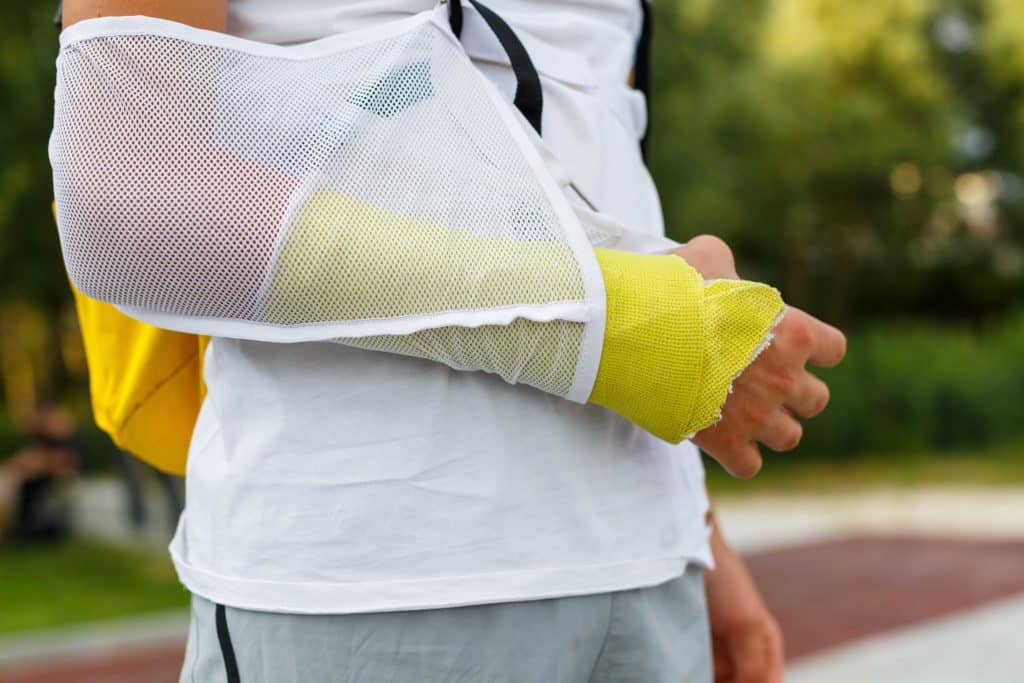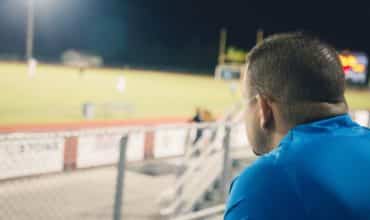In this post
Seven tips on how to encourage an injured athlete (from a mom who has been there.)

Injuries are an unfortunate reality for athletes of all levels, and the road to recovery can often be long and challenging. As a coach, teammate, or loved one, it’s crucial to provide the necessary motivation and encouragement to help an injured athlete navigate this difficult journey.
From maintaining a positive mindset to implementing effective rehabilitation plans, numerous strategies can play a pivotal role in their recovery process.
By understanding the importance of empathy, setting realistic goals, and fostering a supportive environment, we can empower our young athletes to overcome adversity and regain their strength both physically and mentally.
Whether you’re a coach looking to inspire your team or a friend wanting to offer support, these strategies will serve as valuable tools to help an injured athlete triumph over their setback and return to the game they love.
Youth Sports injuries can happen at any time
Maybe it was at practice or just fooling around in your backyard. It could happen at a scrimmage or a major competition. Everything seems fine, and then suddenly, you see your kid go down.
An abrupt gasp echoes from the crowd, then a stirring silence follows while the trainers rush in to assess the severity of the injury. You hear whispers of concern as you sit still over what transpired. Everyone breathes a sigh of relief your athlete gets up, shakes off the pain, and returns to play.
There are times, however, when this scene plays out very differently.
Understanding the mental and emotional challenges of an injured athlete.
Sometimes we watch as our child sustains a sports injury that is serious, and the rest of the story can be upsetting and traumatic, heartbreaking, and perhaps even life-changing.
This is what happened to my 17-year-old son when he went in for a tackle during a club soccer game several months ago on a warm summer day. He saved the goal, but he has yet to play again.
After finding out that he tore his ACL, and MCL, and shredded his meniscus, I sobbed, I was so devastated for him, knowing he would be facing a long road of grief and suffering through the painful recovery, as well as missing out on achieving goals he set for himself.
Every sports parent knows how exhausting and rewarding it is to play a competitive sport or activity. My son has worked tremendously hard, and he had big goals for his junior year in high school. He had recently joined a new travel soccer club that would soon involve a much higher level of play and college recruiting tournaments. He had high hopes to finally earn a starting position in his high school varsity soccer team next season too. He was ready to push hard to make it to the state competition in his upcoming wrestling season as well.
Now it was all gone, taken away in a moment. I knew this loss would derail his dreams and I was so incredibly sad for my son.
The importance of empathy and support during recovery
Playing sports has been an integral part of my son’s life since he could run and kick. Knowing the effort he has put in over the years to get to this point, we were devastated.
As his parents, we knew we needed to help him face a new and painful reality that this year will be empty of it all and replaced with rehab and resting–and trying to fill a large gaping hole in his life that he’s never had before. We knew it would be challenging for him to accept the slow and agonizing process of re-entering back into athletics.
Unfortunately, he will never wrestle again but he is determined to return to soccer.
It’s been eight hard, long months of his painful recovery, and we are hopeful that next month he can slowly start to train again.
I’ve learned so much while going through this agonizing season of healing and heartache with my son, and I am incredibly proud how he’s stayed motivated and positive most of the time.
Here’s what I’ve learned in this challenging process:
Seven tips on how to encourage an injured athlete
Do everything you can to be there for your kid.
When we scheduled my son’s surgery, I knew I needed to clear my schedule to the best of my ability. I canceled almost every obligation I could and took time off of work to be there for my son.
I knew the initial recovery would be hard and painful, and he would depend on me to do everything. It was like a full-time job, taking care of him all summer.
I slept on the couch to be near him as he stayed in the reclining chair to elevate his knee. We spent sleepless nights together while he whimpered in pain for days, which turned into weeks. There was non-stop icing, wrapping, and tending to the wounds while doling out pain meds and charting it all. There was sponge-bathing and changing clothes, making his meals, and helping him to the bathroom.
But it was also about emotionally being there for him. No matter how old or independent they might be, they will want their mom (or dad) when they go through a traumatic injury.
I decided to put everything else aside to care for my son and be present in the physical pain and emotional strain he had to endure. We were fortunate that I could take time off to be with my son, but if you can’t, try to have someone else be there for as much time as possible, such as a grandparent, relative, or trusted family friend.
Creating a structured rehabilitation plan.
Find meaningful and productive ways to pass the time while they heal.
We knew my son would be stuck inside the house for the entire summer, aside from rehab and doctor appointments. He would miss all the fun stuff: summer tournaments, trips, and activities with friends.
Life goes on for the rest of the world while your kid sits on the sidelines or, in our case, is stuck at home. The loneliness can hurt just as much as their physical suffering.
My son and I had long talked about watching every Marvel movie ever made, and that’s what we did during his recovery process. We spent countless hours together, him explaining each one to me.
Thankfully, as the weeks went by, some of his friends would visit and bring him gifts and snacks, and that helped him feel connected to the outside world once again. In time, they would take him for rides around town just to get him out of the house. I’m so grateful for those kids who went out of their way to visit and help their hurting friend. It raised his spirits and gave him something to look forward to during the hardest part of his recuperation.
If your athlete is stuck at home during the recovery process, help them plan what they can do during the long recovery road ahead. The more they can add some structure to their days, the better. And hopefully, some friends and family can show up to visit and spend time with them too.
Providing emotional support and encouragement
It’s important to control your own emotions while you support them through theirs.
It’s hard not to fall apart when watching your child suffer, but we need to be strong to help them with their healing. We can seek counsel and support from other adults or our spouses, but our kids do NOT need to take on our negativity about their situation.
If the injury is serious, understand there will be a grieving process that takes place, and it will have its own stages, just like any other loss. You may grieve the end of their sports experience as well, knowing that this is not the way it should have finished.
Your injured athlete may feel sad and depressed, lost and afraid, angry and frustrated, and wonder if their life will ever be normal again. They will go through a rollercoaster of emotions throughout their recovery and have to accept that they can’t do what they love over and over again. They will get their hopes up for progress and sometimes be completely discouraged when they have setbacks in their recovery.
We must keep our feelings in check while we console, encourage, and validate our kid’s feelings. We must stay focused on helping them process and manage their mental health struggles through this hard season.
Be sure not to push them too fast, and don’t tell them things will be fine because that dismisses their feelings that are valid and justified.
They need affirmation and deserve recognition for all the challenges they are experiencing. They may take their frustrations out on you because those awful emotions must be released somewhere. Know when to sit with them in their pain and when to offer hopeful encouragement, too.
It will be challenging to determine what they need at times, so tune into your child cautiously and adjust according to their behavior and response to what you are doing. Listen to the professionals, like the physical therapists and athletic trainers but also trust your gut.
Remember, your athlete isn’t just dealing with the physical pain of this traumatic injury. They are experiencing grief and loss for everything else they are missing out on in their lives too.
Just like any other hard things our kids go through, we need to stretch out of our adult minds and try to understand it from their point of view. It doesn’t matter how silly or small it may seem to you, to them, it feels enormous and real.
Honor their pain as they heal in their way and in their own time. Don’t tell them what they should be feeling or have expectations at all.
Your job is to listen, console, encourage, and affirm.
Related: These Are the Mistakes I Made That Caused My Daughter to Quit Sports
Incorporate positive reinforcement and rewards
They might need the motivation to get back into life despite their limitations.
“What is the point?”
There may come a time when your kid shuts down and decides that putting effort into anything isn’t worth it at all. They might say they’d rather stay home than go to practice and sit on the bench while watching everyone else train. They might think attending competitions, meetings, team dinners, or any event is irrelevant and unnecessary. They might choose not to go out with friends because it’s too difficult getting around because of their injury.
There will be many opportunities for your kid to say no and take the easier road. It’s easy to allow this to happen because you know your poor kid has been through so much, and you don’t want to push them through more.
But sometimes, we need to tell them they simply can’t give up or give in to their limitations and skip out on the life that is waiting for them. They may need a motivational pep talk to get them out the door once again. They may need some tough love.
I remember when my son was struggling and in a really dark place, not wanting to do anything at all. Unfortunately, the severity of his surgery required him to be on crutches for much longer, and this upsetting news ruined his plans. He was in need of a serious pep talk and a change of perspective to get him back into life again.
One day, I decided we needed to get out of the house. Of course, he resisted, but I insisted, so he begrudgingly got up while he groaned and complained that he didn’t want to go. But I kept pushing him to move, so with his crutches, he reluctantly worked his way into the car.
I drove us to a little cove and helped him trudge to the water’s edge, where I set up our chairs and sat for an hour. Getting him out of the house and somewhere peaceful and quiet was necessary after so many weeks stuck at home.
He not only needed a change of scenery, but he needed a come-to-Jesus moment too.
Healing takes more time than we want to allow, and my poor kid’s hopes were crushed during this latest setback. Although I understood his disappointment and affirmed his feelings, I pushed him to go forward with new expectations.
And thankfully, he did. He never missed a practice or game and upheld his commitment to the team even though he sat on the sidelines for the entire season.
When your kid seems stagnant, unmotivated, hopeless or isolated, it might be time to give them a push to get back into life again. It won’t be easy for them or for you. But it’s an important step that is necessary to help them see that life isn’t over.
The proof is right outside the door,
Look for signs of depression.
There were times I worried about my son’s mental health during those dark days in the beginning. I kept a close eye on him as I knew he could easily experience mental health issues that might require medical attention.
Sometimes, when it rains, it pours. During my son’s recovery, both of his beloved grandparents died, adding much more grief and sadness to his life. I was prepared to call a mental health professional if he showed serious signs of depression.
Some injured athletes also take a blow to their self esteem during this time. They might gain weight or feel like they lost their identity when they can’t participate in their sport.
While it’s absolutely normal for our injured athletes to feel depressed, unmotivated, irritable, and angry, sometimes they might require additional help if their symptoms are severe or last for a long period. Pay careful attention to your kid through the recovery process, and if you see any signs of anxiety or depression or suicidal ideation, seek out a mental health therapist as soon as possible. Some red flags might be:
- Persistent sadness and crying.
- Lack of interest in doing anything.
- Struggles with insomnia or sleeping constantly.
- Feeling hopeless about everything.
- Loss of appetite or overeating.
- Using any drugs or alcohol to cope with their feelings.
- Isolating and not interacting with others.
- Constant agitation or angry outbursts.
- Self-injuring.
- Talks about suicide in any way.
Related: Signs Of Teenage Depression And How To Help
Fostering a positive team and support system
Depending on the injury, your athlete may need rehabilitation, specialized training, and follow-up visits throughout the healing process. This all takes tons of time and energy, and your kid will need your support through it all.
As much as possible, try to adjust your schedule to go with them to these appointments or find trusted family members and friends to assist when either parent can’t be there.
Since my son couldn’t drive, I took him to countless physical therapy sessions for several months and every follow-up visit with his surgeon. I wanted to support him through the painful rehab and be by his side when he was uncomfortable with the social aspect of meeting new therapists.
Injured athletes are already struggling with their limitations; the last thing they need is to endure any more discomfort with managing it all on their own.
Once I knew he felt confident alone, I would drop him off, but I stayed involved. I made sure he was focusing on the positive feedback of his physical recovery and didn’t dwell on any minor setbacks in his rehabilitation program.
During our drives to and from his sessions, I would ask how he was feeling or how it went and give him an opportunity to share whatever he was experiencing. Sometimes he was in pain and frustrated, while other times, he was excited about his progress. I wanted to console and encourage him through those tough visits while celebrating his hard work and progress.
I believe it’s essential for our kids to know we are in this with them–ALL in. I chose to be with my son through every grueling, painful, and victorious step of the way.
Celebrate milestones and progress towards recovery
At the beginning of the process, we worked on goal setting to get him through this difficult process, including getting back on the field.
I haven’t yet reached this step in the long process of re-entering athletics with my son, but I am already trying to prepare myself for when he begins training with his team and competing again. He (and I) will have to endure the very slow process of starting all over again it will take patience, time, and hard work to regain his strength, endurance, and skill level back.
Like most kids, he will want to dive in fast and hard but that will not be allowed. I anticipate him feeling frustrated with yet another slow process and discouraged about how much time it will take to get back to a high-performance level of play. He might also be nervous about reinjuring his knee and have to overcome that fear each time he plays.
However he feels and whatever he experiences through this next season of recovery, I want to meet him where he’s at and support him through each step. It will be challenging no matter how this unfolds, and I need to control my emotions. It will be terrifying to watch him play knowing he can get injured again, but we want to stay positive so our son has the support he needs to be courageous and confident that he will succeed.
A sports injury is an excellent opportunity to develop resiliency
From one parent to another, I know how exhausting and difficult it is to get through this time with your injured athlete.
We want the best for our kids and when they experience a loss and are faced with a hard road ahead, we feel the weight of it all.
No experience is the same. No athlete is the same. And certainly, how we heal and manage it will be different for everyone involved.
But please remember that our greatest growth is formed in the hardest parts of life, and I’ve found this to be true with my son.
As agonizing as this has been, my athlete has developed resiliency, strength, newfound interests, and a deeper, more meaningful, and purposeful perspective.
I hope and believe that the valuable lessons and significant growth that occurs with your athlete will be much of the same.
Are you in the thick of raising your tweens and teens? You may like this book by Whitney Fleming, the co-owner of Parenting Teens & Tweens: Loving Hard When They’re Hard to Love: Essays about Raising Teens in Today’s Complex, Chaotic World.

*This post contains affiliate links where we may earn commissions for items purchased from links on our site.







i7ik2d